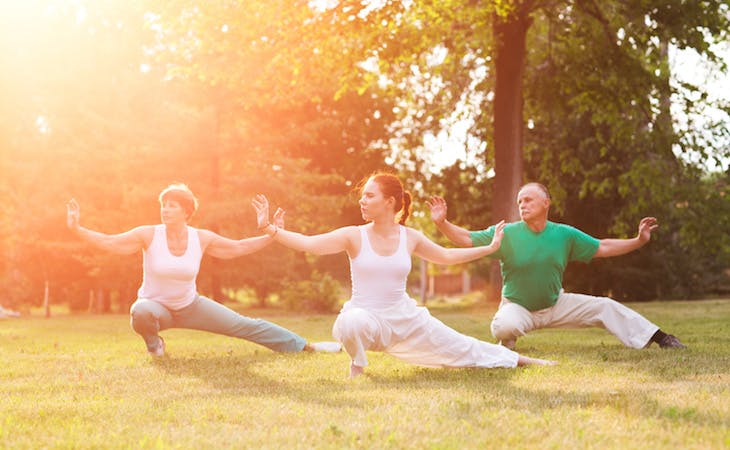Slow, fluid movements. People in loose, silk clothing. A soothing waterfall rushing in the background. These are the images that may come to mind when you picture individuals practicing tai chi. But what is tai chi exactly? And what is it good for?
As it turns out, there are many tai chi health benefits, one of which includes improved sleep. Here’s everything you need to know about tai chi and how to practice it for better shut-eye.
What is tai chi?
Chris Cinnamon, head instructor of Chicago Tai Chi, explains that the exact historical origins of tai chi are “murky” with “conflicting stories and legends.” He says that “most authorities report that tai chi originated in China as a martial art at least 300 years ago.”
Today, this smooth, purposeful form of low-impact exercise is practiced the world over. Consisting of a series of movements called “tai chi form,” it’s typically practiced quite slowly—but Cinnamon says the movements can also be practiced “at speed.”
Geared toward adults of all ages, there are particular benefits of tai chi for seniors, something that’s been proven through research. For example, one study published in the Journal of Exercise Rehabilitation found that tai chi is effective at improving balance and fear of falling in older adults.
“Tai chi can be especially attractive to older adults because of the low-impact nature of the movements,” says Cinnamon. “Unlike many forms of Western exercise, tai chi doesn’t pound the joints or strain muscles or connective tissue. In tai chi, we also emphasize precise biomechanical alignments and posture, helping the body move with more efficiency and less strain.”
Benefits of tai chi for sleep and health
No matter what age you are, tai chi can bring about a variety of health benefits. Cinnamon highlights the biggest physical health benefits of tai chi:
- With constant and complete weight shifting, hip rotation, and slow stepping, tai chi thoroughly works leg and hip muscles.
- As a cardiovascular exercise, tai chi elevates the heart rate similarly to brisk walking.
- It encourages improved balance, which can help you avoid falls.
- It alleviates chronic knee pain, something that Cinnamon details in his book Tai Chi for Knee Health: The Low-Impact Exercise System for Eliminating Knee Pain.
Another major benefit of practicing tai chi is stress reduction.
Cinnamon shares three ways that tai chi can oftentimes equal less stress: “First,” he says, “tai chi trains you to feel your body with increasing detail and depth. Once you develop greater awareness and sensitivity to your body, you begin to feel where you are holding tension. With that awareness, you can begin to release the tension.”
He adds that secondly, tai chi trains you to move in a smooth, connected, whole-body manner.
“Much of that process is neurological, training the nerves to function more smoothly,” says Cinnamon. “The smoothness you develop in tai chi can carry over to other parts of life. In that way, tai chi helps you become less susceptible to stressing out.”
And as if those benefits weren’t enough, thirdly, Cinnamon says that tai chi can produce focused awareness, something else that can lower stress.
“The movements are sophisticated,” he explains. “The focused awareness helps a practitioner spend more time in the present moment, rather than accumulating stress by lamenting the past or feeling anxious about the future.”
As a result of decreased stress, you may enjoy another proven benefit of tai chi—and that’s better sleep, namely through decreased insomnia.
“Several research studies show that tai chi improves sleep quality and reduces insomnia,” Cinnamon says. This could be because tai chi can reduce your baseline stress level. “This may contribute to how tai chi promotes better sleep,” adds Cinnamon.
Beyond curbing stress, just the act of getting moving could also explain why tai chi is good for sleep.
“One reason for this positive result could be that tai chi is exercise,” says Cinnamon. “It gets people moving, even with medical or physical conditions that prevent other types of higher impact exercise. Generally, more active people sleep better.” (Learn about the sleep and health benefits of qigong and the sleep and health benefits of pickleball.)
How to do tai chi
If you’re interested in starting a tai chi practice, Cinnamon recommends finding a teacher and class environment that’s comfortable and convenient, something that will make you more likely to stick with it. (Cinnamon’s studio, Chicago Tai Chi, for example, offers a variety of online classes so you can work out from the comfort of home.)
Watch Cinnamon’s video to learn how to master the fundamentals of tai chi:
For beginners, Cinnamon suggests committing to a regular practice of at least five days per week but broken down into short sessions of 10-15 minutes at most. “Go for frequency, not duration,” he says. “This helps develop the habit of practice without burdening a person’s schedule.”
As you learn more material and experience the benefits, Cinnamon says your practice time will likely increase naturally. By doing 30 minutes of tai chi five days per week, you’ll meet the minimum physical activity guidelines and will enjoy a dramatically reduced risk of leading chronic diseases, he says.
The bottom line: “In the exercise and fitness industry, fads come and go,” says Cinnamon. “Exercise routines and equipment change like fashion. In contrast, tai chi is time-tested. Over centuries, tai chi has been used as a means to maintain vibrant health. Current medical research confirms what was discovered in China long ago: Tai chi can be powerful ‘medicine.’ And it’s a lot of fun.”
Want to work out without leaving your bedroom? Here are the most effective exercises you can do from bed.




